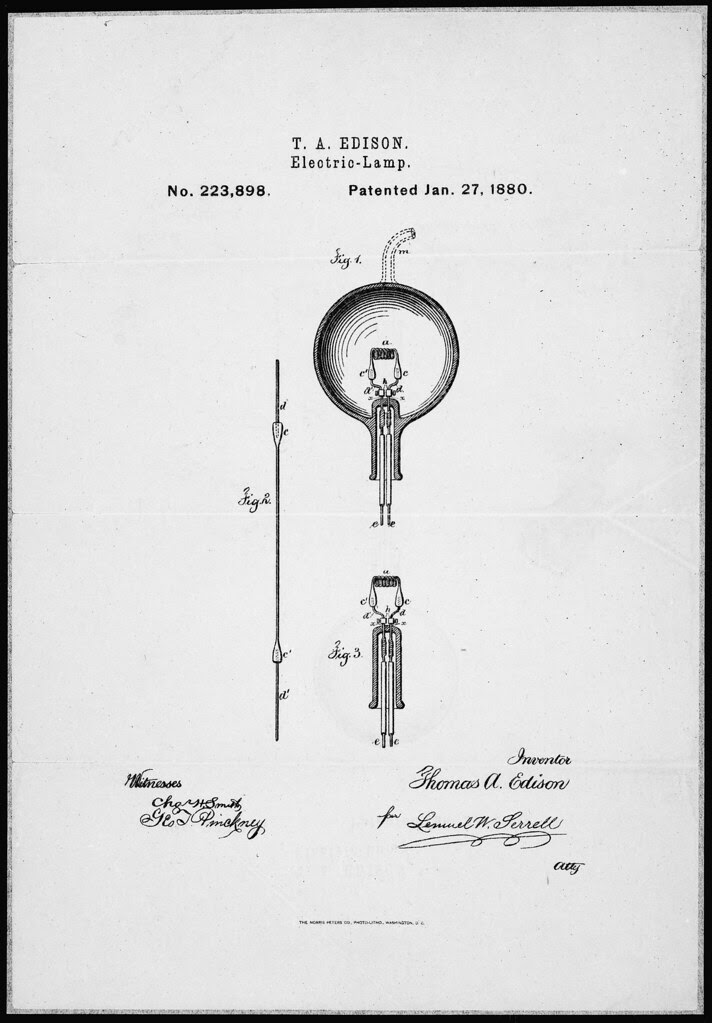
Drawing of the Incandescent Light Bulb (page 2 of 2): Thomas Edison, 27 January 1880 (Records of the Patent and Trademark Office, US National Archives)
Without it, what savage unsocial nights
Our ancestors must have spent! All those deadly
Winter nocturnes in caves and unillumined icy
Fastnesses: they must have laid around and
Grumbled at one another in the dark like the blind,
Fumbling each other's features for the wrinkle of a smile.
What tedious repartee must have passed! Perhaps
This accounts for the dullness of much archaic
Poetry, whose somber cast is notorious and must
Have derived from the traditions of those
Long unlanterned nights. Jokes came in with candles.
How did they see to pick up a pin, if they
Had any? How did they get dinner down? Think of
The mélange of chance carving that must have
Ensanguined dining after dusk! Lights out,
Not even love's what it's cracked up to be.
The senses absolutely give and take
Reciprocally. One wants to know whether that's
An elbow, a knee, or the night table
Before one returns the favor of a friendly nudge.
Wasn't it by the midnight taper all writers once digested
Their meditations? By that same light we ought
To approach them, if we ever expect to catch
The tiger-moth of inspiration that dances
In the word incandescent.
Our ancestors must have spent! All those deadly
Winter nocturnes in caves and unillumined icy
Fastnesses: they must have laid around and
Grumbled at one another in the dark like the blind,
Fumbling each other's features for the wrinkle of a smile.
What tedious repartee must have passed! Perhaps
This accounts for the dullness of much archaic
Poetry, whose somber cast is notorious and must
Have derived from the traditions of those
Long unlanterned nights. Jokes came in with candles.
How did they see to pick up a pin, if they
Had any? How did they get dinner down? Think of
The mélange of chance carving that must have
Ensanguined dining after dusk! Lights out,
Not even love's what it's cracked up to be.
The senses absolutely give and take
Reciprocally. One wants to know whether that's
An elbow, a knee, or the night table
Before one returns the favor of a friendly nudge.
Wasn't it by the midnight taper all writers once digested
Their meditations? By that same light we ought
To approach them, if we ever expect to catch
The tiger-moth of inspiration that dances
In the word incandescent.
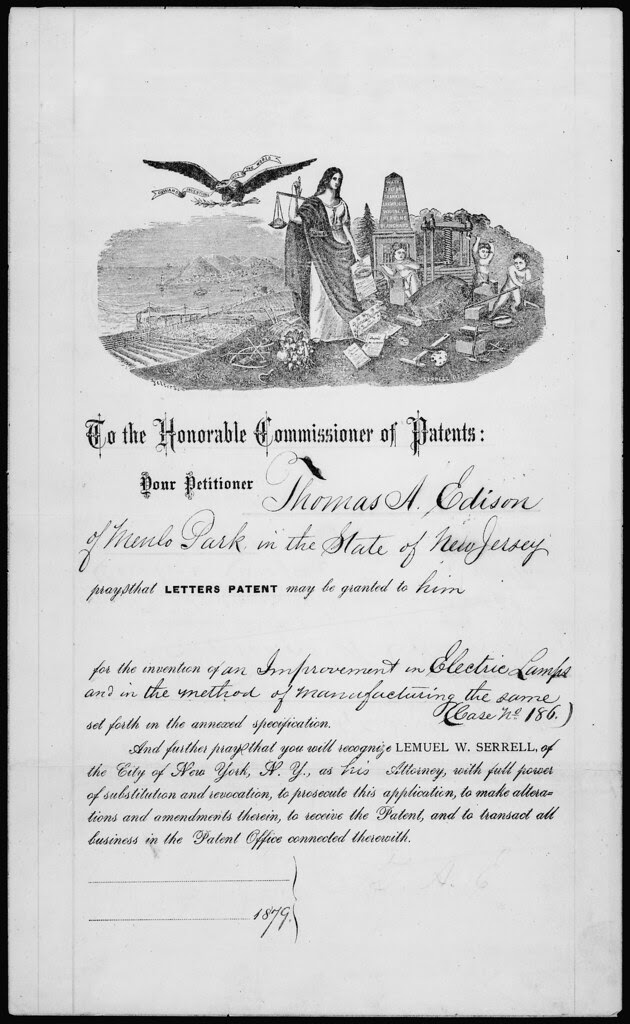
Drawing of the Incandescent Light Bulb (page 1 of 2): Thomas Edison, 27 January 1880 (Records of the Patent and Trademark Office, US National Archives)
Chrome table lamp: S. van Ravesteyn, 1925-1927 (NAI Collection / Het Nieuwe Institut)
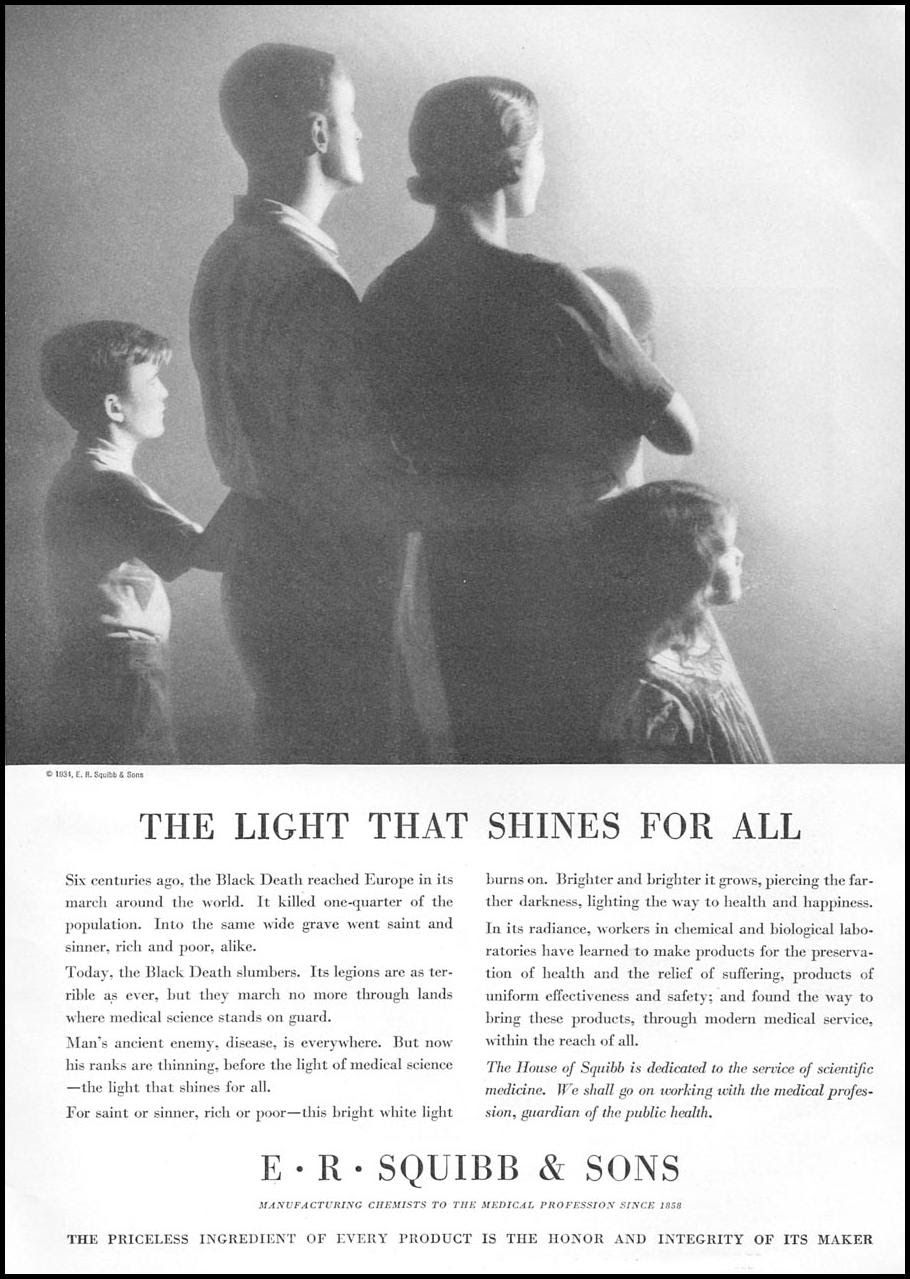
E.R. Squibb and Sons advertisement for Squibb Pharmaceuticals: Good Housekeeping, 12 January 1934 (Gallery of Graphic Design)
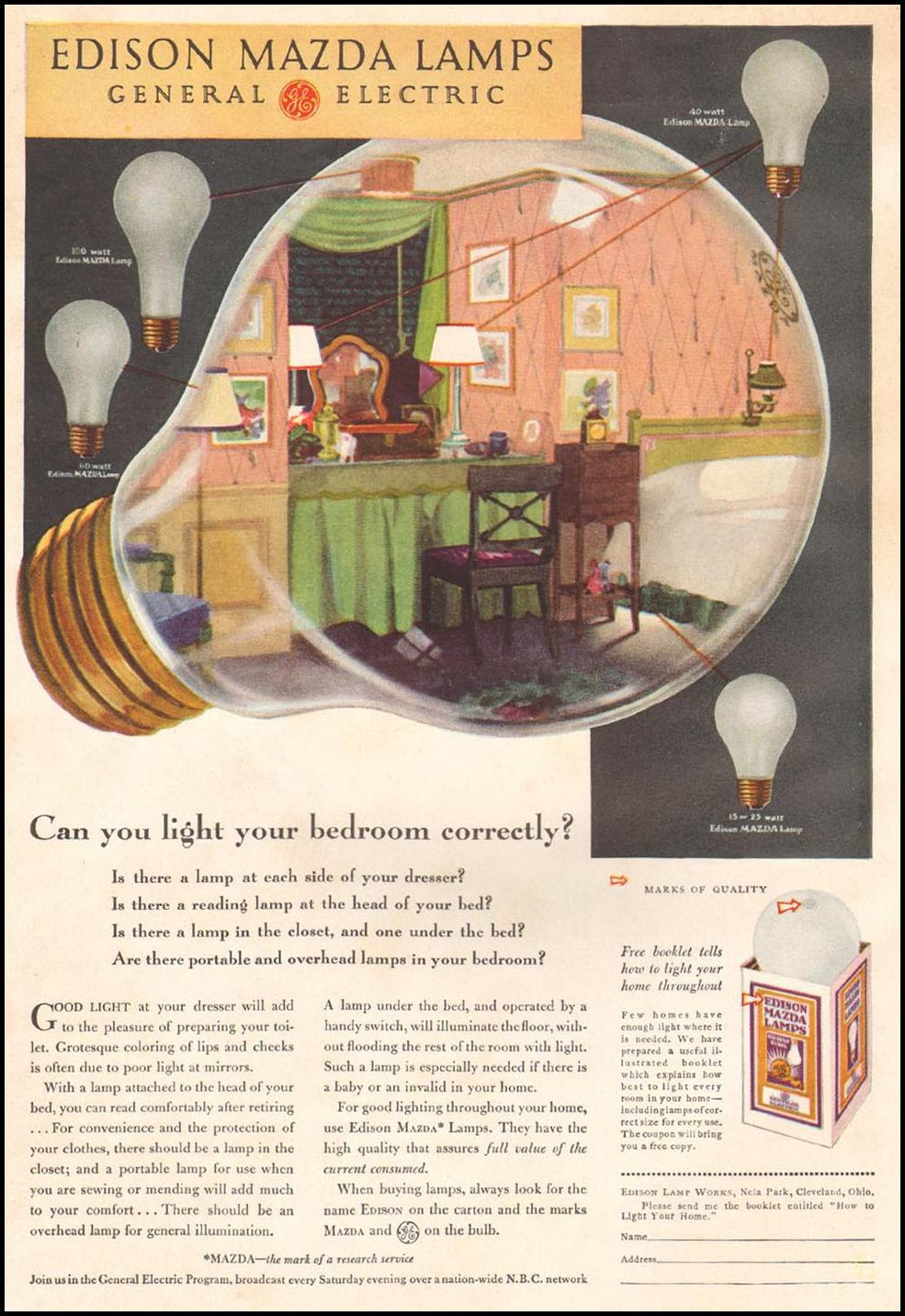
General Electric advertisement for Edison Mazda Lamps: Better Homes and Gardens, 4 January 1931 (Gallery of Graphic Design)
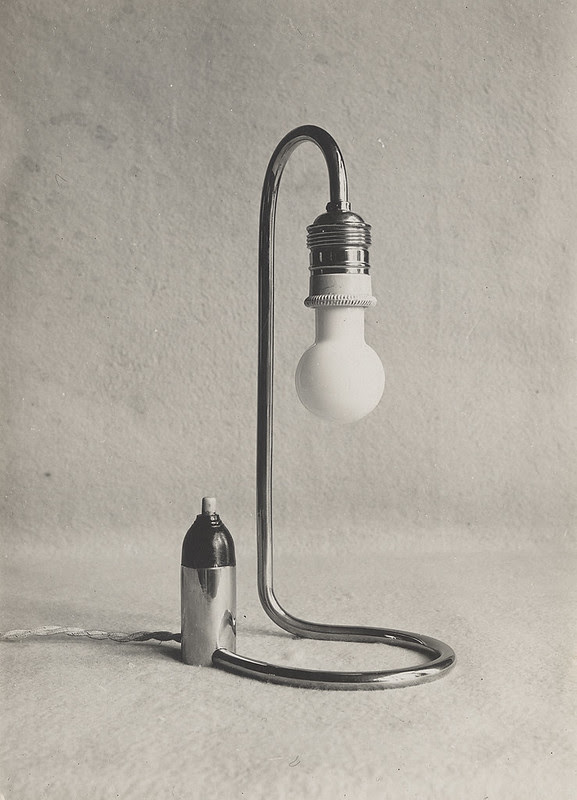



9 comments:
"That is, it points back to the importance of illumination in Bentham's original model of the Panopticon, which called for flooding space with light to eliminate shadows, and to make a condition of full observability synonymous with effects of control."
--J. Crary, 24/7.
Tom, Lovely poem. Will we someday feel about incandescent light bulbs the way we do about candlelight as they are phased out for twisty ugly but energy efficient ones?
-David
brilliant, in other words
Michael,
In other words, I couldn't have said it better myself.
David,
Our nostalgia for incandescence will no doubt come before long to seem yet another bit of old folks foolishness; however, I share it, to an extent. The last power failure was a reminder that cats and candles make a dangerous mix.
billoo,
As it happens, matters of sleep and sleep deprivation are of particular interest here, this blogger being an incurable insomniac. Photosensitivity further blurs the plot. Lighting per se became an issue of special interest some two and a half years ago when I was struck by a car and nearly killed at a poorly lit intersection. As I lay returning tentatively to consciousness on my back with part of head gone, seeing through red the first thing I could make out was the overhead arc lamp, so bright I can't imagine it wouldn't have been bright enough to allow the driver to see me. It turned out her windows had been steamed up because she'd got in car, turned on heater, had no defogger, drove on freeway feeder anyway, and would have hit me had all the lights in Vegas been trained upon the spot. After I was struck, mistakenly anticipating litigation from the hapless victim, the city installed LED lights at that intersection. No pedestrian fatalities since then, though that's largely because the cowed denizens now wisely avoid that corner altogether.
I digress. The Crary book is indeed important. In particular his emphasis on the sense that "we are not… simply passing from one dominant arrangement of machinic and discursive systems to another. That books and essays written on ‘new media’ only five years ago are already outdated is particularly telling, and anything written with the same goal today will become dated in far less time. At present, the particular operation and effects of specific new machines or networks are less important than how the rhythms, speeds, and formats of accelerated and intensified consumption are reshaping experience and perception."
I think maybe more people have that sense than are able to admit it to themselves let alone one another. The implications are just too frightening.
About incandescence, a subject to which in this lifetime 'tis doubtful we shall e'er return -- a couple of rainy day reminiscences -- I once long ago toiled humbly as a book reviewer, and was always more than a bit shocked when I found that another in this humble trade had risen above it, to any degree -- it was this one colleague, who wrote large feature pieces, and if she liked whatever it was, there at the end of the piece, shining out like a Christmas star from the final sentence, would inevitably glimmer the luminous adjective "incandescent".
"LED" just wouldn't have the same melodious ring.
Oh, and the other thing -- it's been raining steadily and heavily, the unstable hillside is groaning with premonitory signals of collapse, and yet the neighbor's christmas light display, including a herd of lit up reindeer, the usual elves, sleighride electric Santa @ c, to the tune of c. 18 million total watts, gleams on through the monsoon -- incandescent, contemporary, inviting calamity, and, you can bet, totally covered for every eventuality. (Owner's an insurance man, surprise.)
Gosh, that does sound scary, Tom. Hope you're better now? "Part of head gone" ..that does sound serious!
Yes, can't stand the sunlight either and am very happy to see it fade in winter.
This is summer here, for me:
Too much sun makes you forget. Too much light obliterates your sense of space or depth-everything seems two-dimensional. The light is a horizon. It makes objects seem less real, less solid, the desert in them making them ghost-like. All you care about is the shade they afford...You start to think about the quality of shadows, the depth of coolness to be gained from them.You want to walk in a perpetual shadow, alone. Even the car casts a thin shade that takes the temperature down a notch. You start to think in terms of degrees, angles, moments of respite, distances from oasis to oasis. What's left of your frazzled mind thinks in terms of equations, energy.
I wish I could call it photosensitivity and get some days off work!
Salams,
b.
I guess maybe we're both "night people".
No, that accident was not nice.
Partial cranial evulsion.
(Jayne Mansfield had the full, result of a head-on vs. semi in deep fog from pesticide sprayer, in the bayou, the multiple hells, thus passing over to a shore from which none return to tell. A mercy really, the quickness, at least, the no time to worry.)
Lost a lot of blood, in and out of the world, dipped into shock and out four times in ambulance to trauma center.
Driver didn't have proper insurance. I'm now a cripple.
All this in fact curiously and coincidentally brought back by your post today, on which I tried thrice but failed to leave a comment, Blogger is always so fickle with its odd pop-uppery (what else is new).
“My body was shivering. I saw death so close and I will never forget the black boots approaching me – I felt as though it was death that was approaching me.”
That part brought back the siren roaring ambulance ride through the gentle madways of death into deepest oakland, which took, it then seemed, from the other side, where all was strangely well, one second (twenty-five minutes??).
"In Australia there's a saying, apparently, that goes like: 'I'll ride with you'. Well, over here all I want to say is: let me off, I don't want to ride with anyone any more."
Yes, but I struggle with the paradox in that. I want to say, "I'm with you." That's the paradox.
I'm so sorry to hear that, Tom-and I'm sorry my post brought back those bad memories.
It's okay, you don't have to write on my blog (or publish my comments here).
This is all very depressing. I'm going to see if I can find any more pictures of Adriana Lima!
On the paradox, Exupery had this line: 'being with' is looking in the same direction. The old problem: me & you.
Keep well,
b.
Enjoyed the poem. Made me think you might enjoy this: https://www.youtube.com/watch?v=QoXUJPghm7k
J
Post a Comment